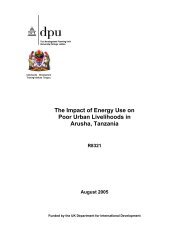EPA Review Annex Documents - DFID
EPA Review Annex Documents - DFID
EPA Review Annex Documents - DFID
Create successful ePaper yourself
Turn your PDF publications into a flip-book with our unique Google optimized e-Paper software.
which relevant entities within their territories are members, comply with the<br />
relevant provisions of this Agreement. In addition, Members shall not take<br />
measures which have the effect of, directly or indirectly, requiring or<br />
encouraging such regional or non-governmental entities, or local<br />
governmental bodies, to act in a manner inconsistent with the provisions of<br />
this Agreement. Members shall ensure that they rely on the services of nongovernmental<br />
entities for implementing sanitary or phytosanitary measures<br />
only if these entities comply with the provisions of this Agreement.’<br />
The SPS measures of non-government bodies has been a major concern within the SPS<br />
Agreement over the last three or four years, sparked by concerns about the potential impact<br />
of private food safety standards on developing countries (Henson and Humphrey, 2009).<br />
There has been much debate over whether the standards developed and/or adopted by<br />
private firms, individually or collectively, fall under the purview of the SPS Agreement. Legal<br />
advice provided to DfID on this issue suggest that private standards of this type are not<br />
covered by the SPS Agreement, 161 although a number of WTO Members evidently remain<br />
unconvinced on this point. 162<br />
The relevance of the above points for the <strong>EPA</strong> negotiations is whether the attendant<br />
provisions on SPS measures are indeed restricted to those measures implemented by<br />
government. There are two relevant issues in this regard. First private standards are<br />
evidently of major concern to developing countries, including to a number of the ACP states<br />
engaged in <strong>EPA</strong> negotiations. Through a strict reading of the SPS Agreement, at least as it<br />
is currently interpreted, private standards fall outside of the purview of the <strong>EPA</strong> negotiations.<br />
Second, the provisions of the <strong>EPA</strong>s as they pertain to SPS measures must be seen as ‘fluid’.<br />
Presumably, as legal interpretation of the SPS Agreement evolves and as the SPS<br />
Committee lays down guidelines and other documents that clarify and/or elaborate attendant<br />
procedures, the scope of the <strong>EPA</strong>s will also change.<br />
While the <strong>EPA</strong> negotiation in broad terms appears to be restricted to the SPS measures of<br />
government, the final agreement between the EC and CARIFORUM does widen the scope<br />
of this particular <strong>EPA</strong> in the area of cooperation (see below). Thus, Point C of Article 59<br />
states that the parties agree to cooperate in the area of:<br />
‘Development of the capacity of enterprises, in particular CARIFORUM<br />
enterprises, to meet regulatory and market requirements.’<br />
This suggests a focus not only on government SPS measures but also private standards.<br />
This is perhaps a useful model for the other ongoing <strong>EPA</strong> negotiations? On the one hand, it<br />
does not open up a ‘can of worms’ by including private standards under the broader rights<br />
and obligations defined by the agreements. On the other hand, it does recognise and<br />
address the legitimate capacity-building needs of the ACP countries in the area of private<br />
standards compliance.<br />
Objectives<br />
All of the final and interim agreements have a broadly common statement outlining the<br />
objectives as facilitating trade between the parties through overcoming restrictions due to<br />
SPS measures while not compromising the ability to protect animal, plant and/or public<br />
health. For example, Article 37 of the interim agreements between the EC and Ghana and<br />
the EC and Cote d’Ivoire states:<br />
“The objectives of this Chapter are to facilitate trade in goods between the<br />
Parties, to increase the capacity of the Parties to identify, prevent and<br />
161 Document G/SPS/GEN/802.<br />
162 <strong>Documents</strong> G/SPS/W/245 and G/SPS/W/246.<br />
236
















